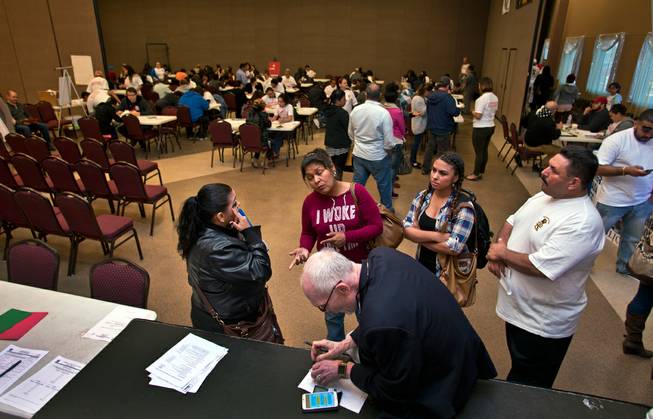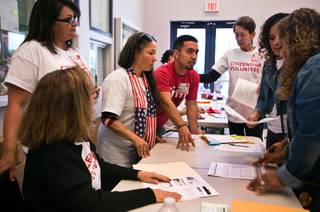
Organizers answer questions during a citizenship drive workshop at the Painters Union on Saturday, April 16, 2016. Organizers have set a goal of helping 2,500 legal resident immigrants apply for citizenship this year.
Friday, April 22, 2016 | 2 a.m.
There are plenty of good reasons to apply for U.S. citizenship.
One that tops a lot of immigrants' lists these days? Wanting to vote — and not just in a general sense, but specifically to make sure Republican front-runner Donald Trump is not elected president of the country they call home.
Some immigrants have been eligible to apply for decades yet put it off, thinking it was too complicated, too expensive or unnecessary. But many of them, spurred by some of Trump’s rhetoric about immigrants, have turned out by the hundreds to citizenship drives across Las Vegas over the last couple of months.
“I don’t like Donald Trump, but unless we vote, there’s nothing we can do,” said David Llamas, 58, sitting in line at a citizenship fair in Henderson on Saturday with his wife and granddaughter. “Latinos work hard, so it’s not fair what he says.”
Llamas, who immigrated from Mexico 35 years ago, said his mindset during previous elections was “there’s nothing we can do anyway,” but this time he felt differently.
“I want to make a difference,” Llamas said. “I just feel excited, that’s all.”
Saturday’s event at the International Union of Painters and Allied Trades was the third of four citizenship fairs sponsored by the Culinary Union, the Progressive Leadership Alliance of Nevada and other community organizations in an effort to help legal residents apply for citizenship and register to vote before the November election. Organizers have set a goal of assisting 2,500 residents.
The groups say Nevada is home to an estimated 90,000 legal permanent residents eligible to become U.S. citizens. They have helped 1,141 of them apply for citizenship at their fairs so far, and the final event is scheduled for April 30 at Rancho High School, in what they are hoping will be their largest.
At the fairs, applicants can get help filling out citizenship applications and consult with lawyers if necessary. Several members of the Culinary Union, which represents 57,000 hotel workers on the Strip and across the state, have taken leaves of absence to facilitate the weekend citizenship fairs and staff the Citizenship Project, where people can make appointments to get help with their applications.
“People want to get the benefits of being a citizen,” said Nelson Lucero, a 26-year-old shop steward who staffed Saturday's event while taking leave from New York-New York. “They can have a voice in this election, and Nevada is so important because it’s a swing state.”
The workshops help break down what can be a daunting citizenship application process. The application is costly, $680, and people often worry about whether they know enough English to pass citizenship tests.
Last year, almost 8,000 people applied for citizenship in Las Vegas, up about 300 from the previous year. The jump nationally was even more significant, with 820,000 people applying for citizenship, or about 50,000 more than the year before.
It’s not unusual to see application numbers increase during an election year, said Fatma Marouf, an immigration lawyer and co-director of UNLV’s law school immigration clinic, adding that some candidates’ “pretty extreme views” on immigration could help boost applications again this year.
Trump has a complicated relationship with immigrants. Both here and across the nation, many immigrants have taken exception to Trump’s remarks, from the day he announced his candidacy and declared most Mexican immigrants “rapists” to his suggestion that the United States bar all Muslims from entering the country.
But during Nevada's February caucuses, Trump received 45 percent of the Latino vote compared to 27 percent received by Florida Sen. Marco Rubio and 18 percent by Texas Sen. Ted Cruz, according to a CNN poll. “You know what I really am happy about?,” Trump asked the crowd at his caucus day victory rally. “Forty-six percent for the Hispanics,” he said, referring to the poll numbers.
At a Treasure Island rally in October, he pulled Colombian immigrant Myriam Witcher — who was enthusiastically waving a copy of People magazine with Trump’s face on the cover — up onto the stage with him, gave her a hug and a kiss, and told the crowd, “That’s my relationship with Hispanics.”
(Trump’s Nevada campaign did not respond to a request for comment.)
Still, Witcher appears the exception, not the rule, in immigrants' attitudes toward Trump.
“There are good immigrants. Trump only points to the bad without considering the good,” said Honduran immigrant Maria Polanco, who mailed in her citizenship application at the end of February.
During a recent interview, Polanco said she was moved to apply after seeing the the way the United States had handled the surge of Central American children into the country in 2014, saying it reminded her of her own story. Polanco came to the United States in 1986 with her 9-year-old daughter, Fanny, who was suffering an acute form of bronchitis. Doctors in Mexico City, where they were living at the time, had told Polanco that if she didn’t get Fanny to the United States for treatment, the girl was going to die.
She made a difficult decision to pack up their belongings and take a bus to Tijuana, where smugglers took them across the border for $700. It should’ve cost $6,000 for two Hondurans, but Polanco said the smugglers took pity on her, a single mother with a sick daughter. They walked for two days and two nights on the beach from Tijuana to San Diego.
But it wasn’t smooth sailing when they got to the United States, nor when they became legal residents. Polanco married a naturalized El Salvadoran man, gaining legal resident status for Fanny and her in the process, but she said her husband would repeatedly threaten to get her legal status revoked. They later divorced.
“All the time, I’m happy with my decision,” Polanco said. “The future was better for my daughter and for me.”
Cuban immigrant Roberto Diaz, a 45-year-old member of the cleaning staff at a local Holiday Inn, said the presidential campaign's anti-immigrant rhetoric started with Trump but didn't end there. Diaz called Texas Sen. Ted Cruz, whose father was born in Cuba, “like Trump but a different form.”
“Now is the moment,” Diaz said. “So many candidates for president are talking racist about Latin people.”
For others, applying is about setting an example to their community. Victor Griego, 44, said that as director of organizing for the local branch of the Painters union, he felt like he needed to motivate his fellow union members to apply for citizenship as well.
“This is what happens within this community,” Griego said. “But sometimes people don’t see it.”
There are practical reasons for applying, too.
“A lot of people don’t understand what an important protection it is against deportation,” Marouf said. “Minor crimes can get you deported as a legal permanent resident.”
That partly sparked 34-year-old Chhen Nguon’s interest in applying. Nguon, whose parents are Cambodian, came to the United States from a refugee camp at the Thai border, where he was born.
He said that after he heard that several Cambodians were jailed for minor crimes, he didn’t want to “risk the chance of losing the only home I’ve ever known.” He added that getting to vote in November would be “a dream come true.”
“I think that (Trump’s) a puppet used to make people afraid,” Nguon said. “I think that fear has been commonly used to divide and separate.”
(After going through the process Saturday, Nguon learned that he had been naturalized through his parents when he was a child — all he needed to do was to fill out an application for a certificate of citizenship.)
Most of the immigrants who had showed up to apply for citizenship on Saturday shared a dislike for Trump. But immigrants are far from a homogenous group.
Sitting in line in a crowded with several dozen other applicants, Filipino immigrant Marietta Baz, 71, admitted in a hushed voice that she liked Republicans.
Who did she plan to vote for? “Trump,” she said, quietly.
Asked why she was supporting him and whether she supported his immigration policies, Baz’s answer was simple: “I just like him. He’s sweet.”


Join the Discussion:
Check this out for a full explanation of our conversion to the LiveFyre commenting system and instructions on how to sign up for an account.
Full comments policy